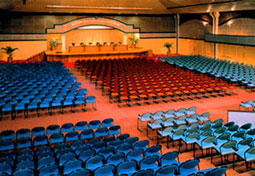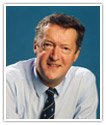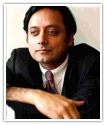| Venue:- Le Meridien Kochi, India |
|
 |
|
| Official Conference Manager |
|
 |
|
|
Keynote Speakers
|
Hon Steve Maharey, Key Note Speaker on Formal Education
 Steve Maharey is the Vice-Chancellor of Massey University, New Zealand. Prior to this, he was the fourth-ranked Minister in Government for nine years, holding the positions of Minister of Education; Minister Responsible for the Education Review Office and the New Zealand Qualifications Authority; Minister of Research, Science and Technology; Minister Responsible for Crown Research Institutes; Minister of Broadcasting; Minister Responsible for Television, New Zealand; Chair of the Cabinet Social Development Committee and Member of Parliament for Palmerston North from 1990 until 2008.
Mr Maharey was responsible for the reforms of the tertiary education sector that began in 2003 and oversaw the establishment of New Zealand's Tertiary Education Commission.
Prior to entering Parliament, he was a senior lecturer in Sociology. Earlier, he was also a junior lecturer in Business Administration and a lecturer in Sociology.
His academic interests include social policy, media, cultural studies, social change and politics.
He is currently working on a book that examines public policy responses to change in the 1980s, 90s and the 21st century. He lists cycling (road and mountain bike), music, cooking and travel amongst his interests.
Steve Maharey is the Vice-Chancellor of Massey University, New Zealand. Prior to this, he was the fourth-ranked Minister in Government for nine years, holding the positions of Minister of Education; Minister Responsible for the Education Review Office and the New Zealand Qualifications Authority; Minister of Research, Science and Technology; Minister Responsible for Crown Research Institutes; Minister of Broadcasting; Minister Responsible for Television, New Zealand; Chair of the Cabinet Social Development Committee and Member of Parliament for Palmerston North from 1990 until 2008.
Mr Maharey was responsible for the reforms of the tertiary education sector that began in 2003 and oversaw the establishment of New Zealand's Tertiary Education Commission.
Prior to entering Parliament, he was a senior lecturer in Sociology. Earlier, he was also a junior lecturer in Business Administration and a lecturer in Sociology.
His academic interests include social policy, media, cultural studies, social change and politics.
He is currently working on a book that examines public policy responses to change in the 1980s, 90s and the 21st century. He lists cycling (road and mountain bike), music, cooking and travel amongst his interests. |
|
|
Professor Emeritus Tan Sri Anuwar Ali, Key Note on Community Development

Professor Emeritus Tan Sri Anuwar Ali, an economist and exponent of higher education, is the second Vice-Chancellor and President of the Open University, Malaysia. His vast experience in the field of higher education spans more than 30 years with a humble beginning as a tutor in the Faculty of Economics and Business at the University of Kebangsaan, Malaysia (UKM) in 1973. From then on, with perseverance and dedication, he rose in rank to become the Dean of Economics in 1993 and ultimately the Vice-Chancellor of UKM on 1 May 1998. In addition to this, he was the Director of Higher Education at the Ministry of Education (1995-1998) and Chairman of the Malaysian Examination Council (2001-2003).
In honour of his invaluable contribution and service to the nation, particularly with respect to research and related work in the nation's industrial and technological development as well as in the realm of higher education, he was conferred the distinguished title of Tan Sri in 2003.Professor Emeritus Tan Sri Anuwar Ali became the VC of OUM on 2 January 2004. Since his appointment, there have been many positive changes in OUM: the establishment of the OUM Alumni Association, School of Lifelong Learning and Centre for Graduate Studies; the ISO certification of the Registry, Centre for Instructional Design and Technology (CIDT) and Tan Sri Dr. Abdullah Sanusi Digital Library; and the offering of financial assistance for physically challenged students.
Besides this, OUM student enrolment has rapidly grown to almost 60,000 students. At the international level, OUM is now offering Masters programmes to students in Yemen, Saudi Arabia and Indonesia. Under his positive leadership, the university is clearly poised to attain the status of a mega-university with a student enrolment of 100,000 by 2010 thus realising one of OUM's noble missions: "To be the leading contributor in democratising education." |
|
|
Ms. Chetna Sinha, Key Note on Social Justice

An economist, farmer, and activist, Chetna Sinha works for social change in some of the poorest and most drought-stricken areas of rural India. She is the founder and the current president of the Mann Deshi Mahila Sahakari Ltd. (the Bank), a micro-enterprise development bank. One hundred percent of Mann Deshi’s clients are poor women with incomes averaging INR 40 (USD 1) per day. The Bank currently has five branches, has over 127,000 clients, and conducts 2,400 transactions on a daily basis. It also provides services to over 2,400 self-help groups, each with ten to twenty women. Chetna also founded the Mann Deshi Foundation (the NGO), a non-governmental organization, which strives to enhance the economic empowerment and advancement of rural women through education, property rights, and social security initiatives. The Mann Deshi Foundation also includes the Mann Deshi Udyogini Business School for Rural Women. This micro-business school is the first of its kind in India and seeks to provide women with vocational and financial training in practical, income-generating areas.
Chetna’s work with marginalized communities began at the end of the 1970s as a leader in the Jayprakash Narayan student activist movement, which fought for democratic and basic human rights during the Indira Gandhi Emergency. Since 1996, she has been organizing women in rural areas of Maharashtra in the fight for their property rights. Through the Bank and NGO, Chetna has promoted a holistic approach to helping her clients – one that combines economic activity with the educational tools and health care necessary to lead a productive life. Since 2006, Chetna has partnered with global organizations such as Deutsche Bank, LGT Bank, Bonita Trust, British Asia Trust and HSBC Bank to develop corporate community partnership programs, which allow the corporate sector in the U.S. and Europe a unique view into the impact of micro-finance initiatives on the local rural population.
Chetna received her Master of Art in Commerce and Economics from the University of Mumbai in 1982 and was a Yale World Fellow in 2002. |
|
|
Dr Caroline Seelig, Key Note on Skill Development

Dr Caroline Seelig is the Chief Executive of the New Zealand based Open Polytechnic, a specialist provider of vocationally orientated open and distance learning.
She has extensive knowledge of the technical vocational education and training sector, and has led or been involved in a wide range of successful collaborative initiatives within New Zealand that have helped drive change and innovation in the tertiary education sector.
A Woolf Fisher Scholar in 2004, Caroline is a member of the Institutes of Technology and Polytechnics Quality Board and also an honorary advisor to the Commonwealth of Learning.
|
|
|
Sir John Daniel 
Sir John Daniel became President of COL in 2004 after gaining wide international experience in universities and the United Nations system.
He obtained his full-time university education in Metallurgy at Oxford and Paris and later demonstrated his commitment to lifelong learning by taking 25 years to complete a part-time Master's degree in Educational Technology at Concordia University. However, the internship for that programme, which took him to the UK Open University in 1972, was a life-changing experience. He saw the future of higher education and wanted to be part of it.
This quest took him on an international odyssey with appointments at the Télé-université (Directeur des Études, 1973-77), Athabasca University (Vice-President for Learning Services, 1978-80), Concordia University (Vice-Rector, Academic, 1980-84), Laurentian University (President, 1984-90), the UK Open University (Vice-Chancellor, 1990-2001) and UNESCO (Assistant Director-General for Education, 2001-04).
His non-executive appointments have included the presidencies of the International Council for Open and Distance Education, the Canadian Association for Distance Education and the Canadian Society for the Study of Higher Education. He also served as Vice-President of the International Baccalaureate Organisation.
Among Sir John's 300 publications are his books Mega-Universities and Knowledge Media: Technology Strategies for Higher Education (Kogan Page, 1996) and Mega-Schools, Technology and Teachers: Achieving Education for All (Routledge, 2010)
He was knighted by Queen Elizabeth for services to higher education in 1994 and holds 30 honorary doctorates from universities in 17 countries.
He is a citizen of Canada and the UK. |
|
|
| Asa Briggs Lecture |
|
Shashi Tharoor
 Author, peace-keeper, refugee worker, human rights activist, a former Minister of State for External Affairs and now a member of the Indian Parliament from the Thiruvananthapuram constituency in Kerala, Shashi Tharoor straddles several worlds of experience.
His UN career began in 1978, when he joined the staff of the United Nations High Commissioner for Refugees (UNHCR) in Geneva, and included key responsibilities in peace-keeping after the Cold War and as a senior adviser to the Secretary-General, as well as the United Nations Under-Secretary-General for Communications and Public Information. Dr Tharoor left the UN on 31 March 2007.
Dr Tharoor is also the award-winning author of eleven books, as well as hundreds of articles, op-eds and book reviews in a wide range of publications, including the New York Times, the Washington Post, the Los Angeles Times, the International Herald Tribune, Time, Newsweek, The Times of India and The Hindu. He has served for two years as a Contributing Editor and occasional columnist for Newsweek International.
His six non-fiction books are: Reasons of State (1981), a study of Indian foreign-policy making; India: From Midnight to the Millennium (1997), which was cited by President Clinton in his address to the Indian Parliament; Kerala: God's Own Country (2002), with text by Shashi Tharoor and paintings by the renowned M.F. Husain; Nehru: The Invention of India (2003), a biography of India's first Prime Minister; a collection of literary essays, Bookless in Baghdad (2005) and another essay collection, The Elephant, the Tiger and the Cellphone: Reflections on India in the 21st Century (2007). His three novels are the classic The Great Indian Novel (1989) which is required reading in several courses on post-colonial literature; Riot (2001), a searing examination of Hindu-Muslim violence in contemporary India, and Show Business (1992) which received a front-page accolade in the New York Times Book Review and has since been made into a motion picture, "Bollywood". He has also authored a collection of short stories, The Five-Dollar Smile (1990) and a photobook, India, in collaboration with photographer Ferrante Ferranti (2008). Shashi Tharoor's books have been translated into French, German, Italian, Malayalam, Marathi, Polish, Romanian, Russian and Spanish.
Dr Tharoor is an internationally known speaker on India's recent transformation and future prospects, globalisation, freedom of the press, human rights, literacy, Indian culture, and India's present and potential influence in world politics.
Born in London in 1956, Dr Tharoor was educated in India and the United States, completing a PhD in 1978 at the Fletcher School of Law and Diplomacy at Tufts University, where he received the Robert B. Stewart Prize for Best Student. At Fletcher, Shashi Tharoor helped found and was the first Editor of the Fletcher Forum of International Affairs, a journal now in its 33rd year. Dr Tharoor was also awarded an honorary D.Litt. by the University of Puget Sound. A compelling and effective speaker, he is fluent in English and French.
In January 1998, Dr. Tharoor was named a "Global Leader of Tomorrow" by the World Economic Forum in Davos, Switzerland. He is the recipient of several awards, including a Commonwealth Writers' Prize, and was named to India's highest honour for Overseas Indians, the Pravasi Bharatiya Samman, in 2004.
Shashi Tharoor serves on the Board of Overseers of the Fletcher School of Law and Diplomacy, the board of trustees of the Aspen Institute, and the Advisory Boards of the Indo-American Arts Council, the American India Foundation, the World Policy Journal, the Virtue Foundation and the human rights organization Breakthrough. Dr Tharoor has been appointed an International Adviser to the International Committee of the Red Cross in Geneva for the period 2008-2011. He is also a Fellow of the New York Institute of the Humanities and the Patron of the Dubai Modern School.
Recently Dr. Tharoor received the Pride of India Award from the Zakir Husain Memorial Founation, Nagpur. The Hakim Khan Sur Award for National Integration was presented to him by Maharana of Udaipur on March 15, 2009. Author, peace-keeper, refugee worker, human rights activist, a former Minister of State for External Affairs and now a member of the Indian Parliament from the Thiruvananthapuram constituency in Kerala, Shashi Tharoor straddles several worlds of experience.
His UN career began in 1978, when he joined the staff of the United Nations High Commissioner for Refugees (UNHCR) in Geneva, and included key responsibilities in peace-keeping after the Cold War and as a senior adviser to the Secretary-General, as well as the United Nations Under-Secretary-General for Communications and Public Information. Dr Tharoor left the UN on 31 March 2007.
Dr Tharoor is also the award-winning author of eleven books, as well as hundreds of articles, op-eds and book reviews in a wide range of publications, including the New York Times, the Washington Post, the Los Angeles Times, the International Herald Tribune, Time, Newsweek, The Times of India and The Hindu. He has served for two years as a Contributing Editor and occasional columnist for Newsweek International.
His six non-fiction books are: Reasons of State (1981), a study of Indian foreign-policy making; India: From Midnight to the Millennium (1997), which was cited by President Clinton in his address to the Indian Parliament; Kerala: God's Own Country (2002), with text by Shashi Tharoor and paintings by the renowned M.F. Husain; Nehru: The Invention of India (2003), a biography of India's first Prime Minister; a collection of literary essays, Bookless in Baghdad (2005) and another essay collection, The Elephant, the Tiger and the Cellphone: Reflections on India in the 21st Century (2007). His three novels are the classic The Great Indian Novel (1989) which is required reading in several courses on post-colonial literature; Riot (2001), a searing examination of Hindu-Muslim violence in contemporary India, and Show Business (1992) which received a front-page accolade in the New York Times Book Review and has since been made into a motion picture, "Bollywood". He has also authored a collection of short stories, The Five-Dollar Smile (1990) and a photobook, India, in collaboration with photographer Ferrante Ferranti (2008). Shashi Tharoor's books have been translated into French, German, Italian, Malayalam, Marathi, Polish, Romanian, Russian and Spanish.
Dr Tharoor is an internationally known speaker on India's recent transformation and future prospects, globalisation, freedom of the press, human rights, literacy, Indian culture, and India's present and potential influence in world politics.
Born in London in 1956, Dr Tharoor was educated in India and the United States, completing a PhD in 1978 at the Fletcher School of Law and Diplomacy at Tufts University, where he received the Robert B. Stewart Prize for Best Student. At Fletcher, Shashi Tharoor helped found and was the first Editor of the Fletcher Forum of International Affairs, a journal now in its 33rd year. Dr Tharoor was also awarded an honorary D.Litt. by the University of Puget Sound. A compelling and effective speaker, he is fluent in English and French.
In January 1998, Dr. Tharoor was named a "Global Leader of Tomorrow" by the World Economic Forum in Davos, Switzerland. He is the recipient of several awards, including a Commonwealth Writers' Prize, and was named to India's highest honour for Overseas Indians, the Pravasi Bharatiya Samman, in 2004.
Shashi Tharoor serves on the Board of Overseers of the Fletcher School of Law and Diplomacy, the board of trustees of the Aspen Institute, and the Advisory Boards of the Indo-American Arts Council, the American India Foundation, the World Policy Journal, the Virtue Foundation and the human rights organization Breakthrough. Dr Tharoor has been appointed an International Adviser to the International Committee of the Red Cross in Geneva for the period 2008-2011. He is also a Fellow of the New York Institute of the Humanities and the Patron of the Dubai Modern School.
Recently Dr. Tharoor received the Pride of India Award from the Zakir Husain Memorial Founation, Nagpur. The Hakim Khan Sur Award for National Integration was presented to him by Maharana of Udaipur on March 15, 2009. |
| |
| |
|
| |
| |
|
| More to come... |
|
|

